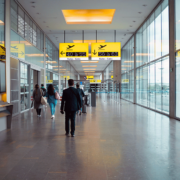Airline staff deficit generates a new crisis in the industry
After two years of the pandemic, the cancellation of thousands of flights, and massive layoffs in the aviation sector, finally in 2022 flights worldwide began to increase rapidly.
This has enabled the recovery of the industry and it could even be said that they are already beginning to generate profits. However, now a new crisis is coming.
We are at a stage where airline offers are falling short of passenger demands, which has caused flight cancellations, thousands of stranded travelers, or even lost luggage, and the industry is now facing a severe crisis of qualified personnel.
The crisis not only refers to the shortage of pilots. It also includes maintenance personnel, technicians, and ground staff, which potentially leads to fewer aircraft in circulation and delays in services as they are unable to handle all the processes related to flight preparation, passenger and baggage control, and everything else involved in the operation.
The main problem is that it is not easy to replace or substitute these qualified personnel who require special certifications to be eligible for a position in this category, which would imply a considerable investment of time rather than solving this difficulty.
However, nowadays there are many devices, software, and technological tools that can serve as support to facilitate and optimize airport processes. This would also accelerate the evolution of the industry aiming at the technological transformation that is so necessary in these times.
According to the Commercial Market Outlook study conducted by Boeing annually, it is expected that by 2041 the world fleet will increase by 80%.
In addition to the development of some market segments such as digital solutions that increase efficiency and reduce costs. But above all comprehensive training allows having qualified pilots and technicians.
The way of facing the crisis generated by the COVID-19 pandemic showed that the aviation industry has a great capacity to adapt and serves as a reference to demonstrate that this current crisis will not greatly affect the development of the sector.
Now they will be focused on offering better incentives to attract that personnel that migrated to other sectors due to the massive layoffs.
But undoubtedly they will also have to work on creating new opportunities for digitalization, without neglecting the most important thing; attracting that 2.1 million new personnel, including pilots, mechanics, and crew members that will make every trip a better travel experience.










Leave a Reply
Want to join the discussion?Feel free to contribute!